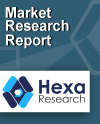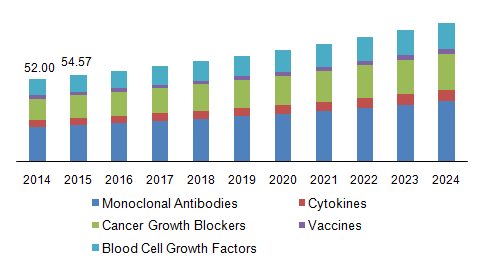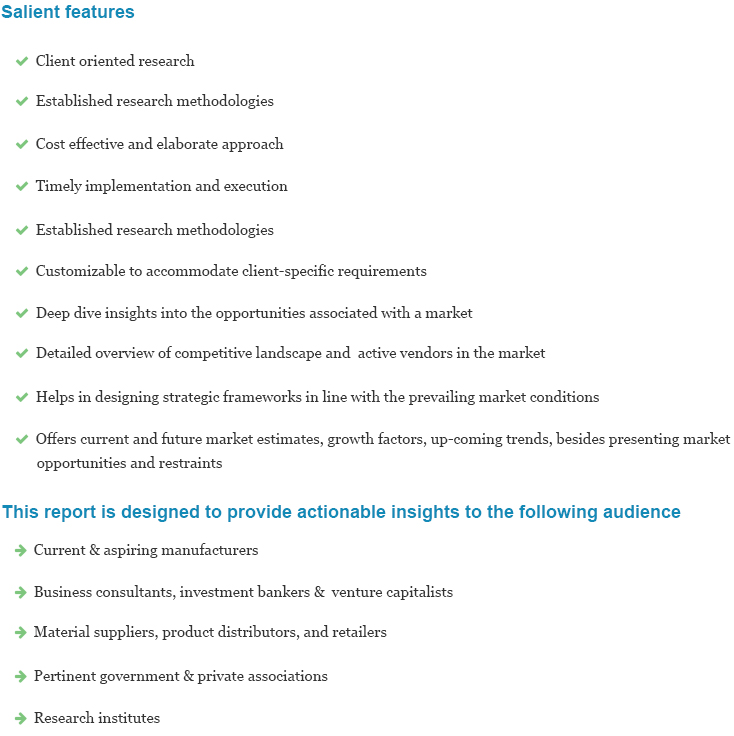
Cancer Biologics Market Size and Forecast, By Product (Monoclonal Antibodies, Cytokines, Cancer Growth Blockers, Vaccines, Blood Cell Growth Factors), And Trend Analysis, 2014 - 2024
- Published: September, 2017
- Format: Electronic (PDF)
- Number of pages: 60
- Industry: Biotechnology
Industry Insights
The global cancer biologics market size is expected to reach USD 87.60 billion by 2024 and is anticipated to grow on account of rising prevalence of cancer, increasing demand for biological and targeted drug therapies. According to World Health Organization, cancer is one of the leading causes of deaths in the world, was responsible for about 9 million deaths in the year 2015 and is expected to increase to 70% over the next two decades.
Global Cancer Biologics Market Revenue, By Product, 2014 - 2024 (USD Billion)

The geriatric population is more prone to the disease. As per American Cancer Association, in 2016, people aged 50 years or older accounted for around 87% of the cases in the U.S. Hence, these statistics provide the opportunity for targeted therapies. However, the high cost of drug development, threat of treatment failure, and stringent regulatory norms are anticipated to hinder the growth.
Biological therapy utilizes body’s immune system to destroy cancer cells. The biological response modifiers such as interleukins and interferons trigger a response against the infection. It involves the infusion of substances for stimulating the cells of the immune system to act more efficiently.
Segmentation by Product
• Monoclonal Antibodies
• Cytokines
• Cancer Growth Blockers
• Vaccines
• Blood Cell Growth Factors
In 2016, monoclonal antibodies segment dominated the market, contributing 42.7% of the total share and is anticipated to continue its dominance over the forecast period. Rigorous research investments to develop novel targeted therapies against cancer has great impetus on the market. Also, several companies are collaborating with several academic institutes such as National Cancer Institute, National Institutes of Health (NIH), USA, among others to develop monoclonal antibody therapies thereby increasing the acceptance of these therapies.
Vaccines are expected to record CAGR of 3.4% over the forecast period. There are mainly two types of cancer vaccines, namely, prophylactic and therapeutic vaccines. These vaccines boost the immune system's ability to recognize and destroy antigens thereby inhibiting tumor growth. Also, vaccines are prescribed to the patient post completion of the treatment to avoid recurrence of these cells.
Cytokines are cell signaling proteins that are produced by lymphocytes and form an essential role in cell communication during an immune response. It helps to regulate the immune responses, inflammation, and formation of new blood cells. It is anticipated to grow at a CAGR of 5.6% over the forecast period.
Segmentation by Region
• North America
• U.S.
• Europe
• Germany
• Asia Pacific
• China
• Japan
• Central & South America
• Brazil
• Middle East & Africa
In 2016, North America dominated the oncology biologics market, accounting for around 42.1% of overall share. The reason for the growth is attributed to the presence of high-tech healthcare infrastructure coupled with well-regulated policies. However, Asia Pacific is expected to be the fastest growing region for oncology-specific therapies owing to increasing awareness for biologics therapies and large patient pool.
In 2016, Japan contributed the highest revenue for cancer biologics in Asia Pacific region. Increasing geriatric population in this country provides an opportunity for the growth of these therapies over the forecast period. Improving healthcare infrastructure and supportive government initiatives in China encouraged industry players to invest in R&D activities and develop novel oncology biologics.
The European market is estimated to grow at a CAGR of 5.5%. Germany accounts for the highest revenue contributor among other countries. High penetration of targeted therapies coupled with the presence of the major industry players in the region is anticipated to increase the market growth. Favorable insurance and public reimbursement policies are estimated to increase the demand for these targeted therapies over the forecast period. Roughly, 90% of the German population are members of statutory health insurance and entitled to receive benefits to maintain and improve their health.
The Middle East & Africa is expected to witness sluggish growth over the forecast period majorly owing to little awareness about cancer therapies and high treatment cost. Increasing number of such cases in Brazil is estimated to boost the demand for oncology biological therapies in Latin America during the forecast period.
Competitive Landscape
This market is consolidated in nature with the presence of few companies operating in multiple regions such as Roche Diagnostics, Bristol-Myers Squibb, Amgen Inc., Eli Lilly and Company, Celgene Corporation, Merck & Co. Inc., EnGeneIC Ltd, Novartis, GlaxoSmithKline PLC and Pfizer. With the prevailing competition, companies are also adopting inorganic growth strategies. For instance, in 2016, McKesson Corporation acquired Vantage Oncology, LLC to expand its expertise in oncology across the globe.

Choose License Type
- World's largest premium report database
- Transparent pre & post sale customer engagement model
- Unparalleled flexibility in terms of rendering services
- Safe & secure web experience
- 24*5 Research support service
